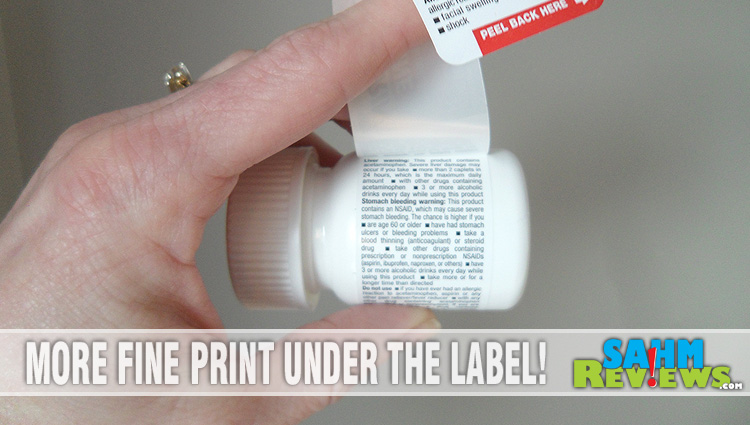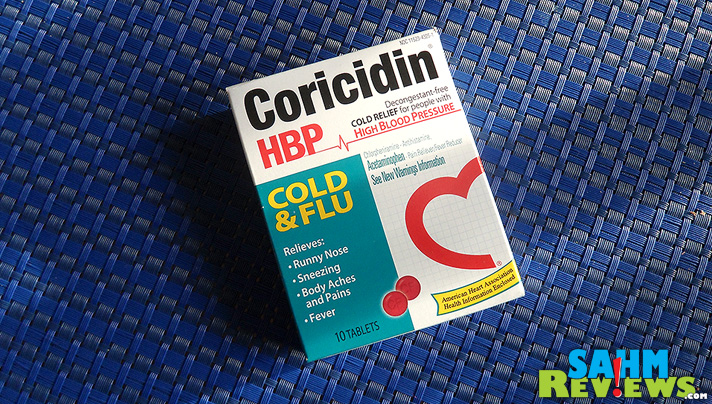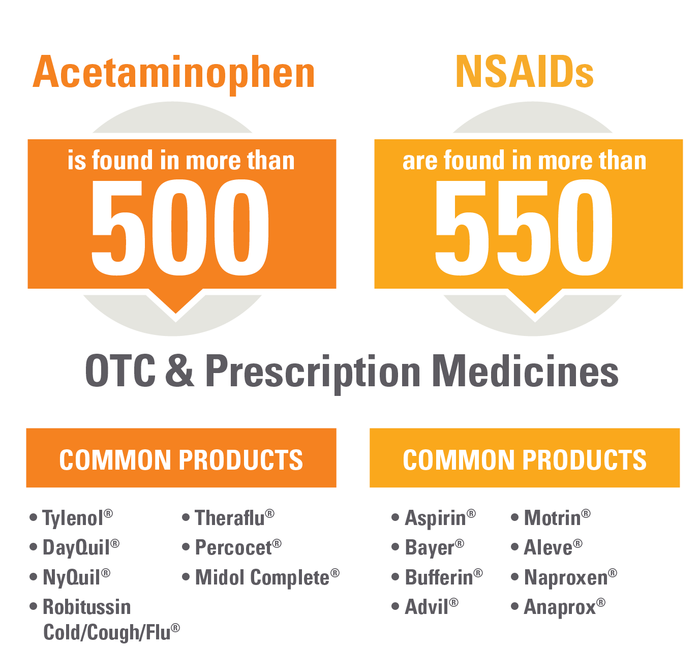Rethink Drug Interaction: Read the Label

Unless we are talking about debilitating cramps or a serious migraine, I’ve never been one to rely on medicine to help me through my aches and pains. Thankfully, I’m not one who suffers from chronic pain so I’m able to be a little choosier than many people. If I’m sore from working out, I revel in the discomfort as a sign that I worked hard. When I’m fighting a cold, I prefer to let it run its course. As someone who takes a regular prescription and has family members who do also, I often think about the issues taking over-the-counter medicines can cause. Even if I go in to pick up a simple antibiotic, the pharmacists makes special note of what regular medications I take to ensure that there won’t be problems with the mixture of the two prescriptions: whether some ill-effect of the combination would happen or whether one of the prescriptions would nullify the other. I take hypothyroid medicine so if a temporary medicine like an antibiotic caused my thyroid medicine to stop working, it wouldn’t be a life or death issue. For people who take blood pressure medicines, that is an entirely different issue. They even make specially designed over-the-counter products to limit the known interactions.

Of course, regardless of whether it is prescription or over-the-counter, a pregnant woman needs to be diligent that she read and follow labels because anything she puts into her body effects more than just her. It is written on the package, as are details about effects of consuming alcohol while using this medication. Yet there is a whole lot more written on the package that few people take notice of. The primary one: Liver damage. You know what I discovered? I’ve never paid any attention to it. There’s a label on the bottle of migraine pills that I take that is clearly marked “Peel Back Here” but I’ve never bothered to peel it back. Sure enough, at the very top of the peeled back portion I found reference to liver damage.
The American Gastroenterological Association developed Gut Check: Know Your Medicine to educate people on the side effects of taking over-the-counter medicines: everything from pain medicines to cold and flu products to sleep medications. According to focus group surveys they conducted last year, many adults now that overdosing is bad but underestimate how serious the dangers are. Many unintentionally exceed the dose limit and end up in the hospital with serious stomach and liver damage. Some think that since they do not require a prescription, that means they are harmless. Others just don’t realize the dosage amounts. Taken in the wrong dosage, too often or incorrectly, they aren’t harmless. “Over-the-counter” is not synonymous with “take as much as you want.” Other people simply disregard the warnings because instant pain relief is more important.
During a webinar with Dr. Anne Larson, I learned quite a bit. According to the AGA, Acetaminophen is currently in more than 500 prescription and over-the-counter products and Non-Steroidal Anti-inflammatory drugs (NSAIDs) are found in more than 550. “You probably recognize it best as the active ingredient in over-the-counter products like Tylenol® and NyQuil® but acetaminophen is also in prescription products like Percocet® and Vicodin®. So if you take Tylenol® for a headache and at the same time take Theraflu® to fight off a cold, you are actually doubling up acetaminophen, despite the fact these medicines were intended for different ailments. “ Similar examples were given for NSAIDs.

A lot of details were provided about how the body reacts to the acetaminophens and NSAIDS but to break it down into layman’s terms, your body can’t process the chemicals and dispose of them fast enough. An overdose is not easily recognizable and symptoms often mimic those of the flu.
It boils down to one simple fact: the warnings are there for a reason. The AGA recommends following these three steps:>
- Read the label
- Take one product at a time
- Talk to a professional about dosage amounts and medicine interaction.
For more information, visit the website, follow #GutCheckAGA or AmerGastroAssn on Twitter, Facebook or YouTube. As I mentioned before, I’ve never been one to rely on OTC medicines but I’m an educated person and should have known to read the labels.
I will from now on. Will you?



Great informational article, Thanks Nicole.
Trish
These over the counter meds are really no joke. And I particularly find the specter of damaging my one and only liver frightening, especially if there is something I can knowingly do to avoid this. Thanks for sharing this and for reminding us to live consciously.
Wonderful info Nicole!! We should all be reading labels!!
Great info! Thank you for sharing this! It is SO important to read labels!
I think that many people don’t even think about over-the-counter medications when they are talking to their doctors or while taking prescription meds. I know the elderly are bad about it. This is a good reminder. Thanks!
I take a couple daily medications that I need and I am always asking the pharmacist if I can take something with the medication I already take. I had an interaction once and it was horrible.
I think it is so important to let people know about this. I have chronic headaches, and when they are really bad I hardly think about dosages and interactions, I am just searching for relief. After reading this I know that I need to be much more careful.
Scary. Since discovering essential oils, we don’t use OTC products anymore.
Oh wow crazy. I am heading straight to my medicine cabinet to see what else is lurking behind those labels.
What a great reminder and informative post! It’s amazing just how powerful OTC medications can be. I know I had to be extremely careful with my parent’s medications as they were on so many.
I am very cautious with OTCs. I try to avoid them all together if possible.
Thank you for the info on this very serious subject. It is a good idea for everyone to check what they have in their medicine cabinet.
Thanks for getting this information out there!
What a great resource. Thank you for posting.
Great info! Thank you for sharing.
Very interesting! I get so overwhelmed when I head out to buy meds for pain or sickness. It’s so unsafe to just buy whatever looks close enough. I’ll have to check this out.
This is something I need to be more careful about. I always just ask my pharmacist but that’s just RX, never the OTC stuff I take too.
I couldn’t agree more and I’m like you. I prefer to let nature take it’s course and only take meds in extreme situations.
I definitely think it’s important to read the labels. I used to work in a pharmacy so it’s something I definitely remember to do.
A great reminder. We don’t use them much but do keep them in the house for those oddball times.
I think there’s so many of us that take medication blindly without really reading the label. Great post and definitely needs more awareness.
This is really great information! I never really think to look too much into the details on medicine labels.
I guess I hadn’t really thought toooooo much about it because I don’t take more than the dosage, but now I never will!
It is so important to be informed.
I have pregnancy-related high blood pressure {which is still lingering despite my baby being 1 month old} &just had a C-Section, so I’ve been on lots of medication. It’s been tough making sure there weren’t any interactions, especially since I already had others medications I had to take!
Great info! Definitely something important to remember. I need to be better about reading for I take.
I am an avid label reader. interactions are a serious thing indeed
My husband is horrible with his medications. He doesn’t read dosage recommendations and thinks you should always take 3 of every OTC med. He really needs to read these labels!!
It’s great that they make the medications for people with HBP! I had to buy some meds for my mom, and She has HBP – So those def. came in handy!
My mother in law had stomach problems as a result of accidentally overdosing on medications with ibuprofen in it so she goes around warning people so I knew but a lot of people really don’t. It’s always a good idea to read the fine details on medications regardless of the type.
Just read this and actually I didnt even think about it doubling up on diff meds!! Thankyou for the awareness!
It is so important to read the labels and know what’s in there. I especially try to avoid Acetominiphen. (sorry I totally butchered the spelling on that).
Wow I didn’t ever really think about reading the labels fully. I tend to read the dosage and that’s about it. Thank you for sharing this I really need to start being more careful.
the only thing that i take medicine is when i am dealing with a very bad migraine that even a sleep could not keep it away…and oh toothache i’m very scared too.
It is important to always read labels when taking something or when putting it inside your body. To be honest, we don’t really rely on medicine at all when we don’t feel good or are sick, not unless it is something really tolerable. I am just scared of taking way too much medicine in the body. And scared of side effects.
Thank you so much for this helpful information. MY husband is very thorough when it comes to reading labes on meds.
It really does pay to read the fine print. You can also ask your pharmacist about over the counter meds if you have questions!
I use too much OTC drugs, especially the pain relievers. I get constant headaches so I reach for them a LOT. Thanks for this great info.